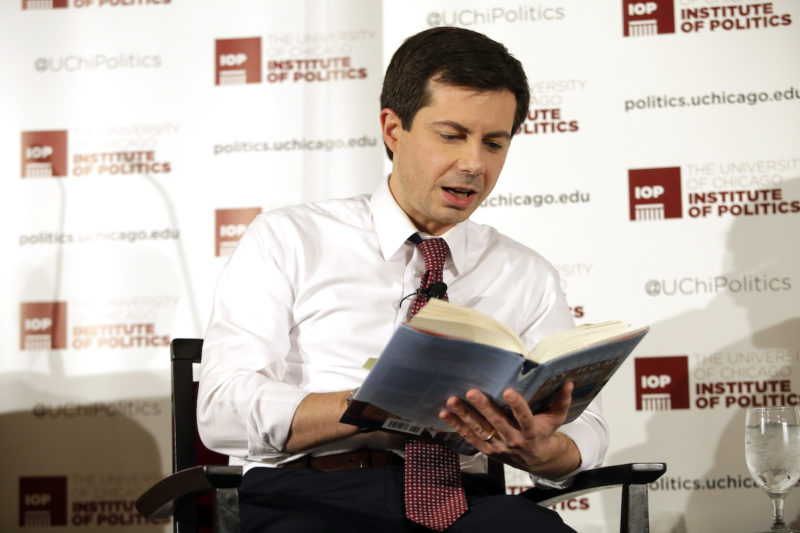Democratic Hopeful Pete Buttigieg Makes Faith 101 Misstep
If you don't understand that the Religious Right's conservatism does not stem from honest differences in faith, if you don't get that it's about particular structures of power, you badly misunderstand the situation, and you are not ready for prime time.

Elizabeth Warren was on CNN the other day, and did a crackerjack job expressing how her faith and politics fit together. Meanwhile, South Bend Indiana mayor, first openly gay candidate running in a major party’s primary, and general whiz-kid Pete Buttigieg was on The View, doing…not so well.
Pete Buttigieg explains why he says America needs an emergence of a “religious left”: “Living your faith might also have to do with paying more attention to those most in need and not celebrating those who already have the most wealth and the most power.” https://t.co/f8u2wc159S pic.twitter.com/0fV980Fn7w
— The View (@TheView) March 22, 2019
Let’s get a couple of quick points out of the way before we get down to the central issue. First, towards the end of the clip, you hear Buttigieg talk about “Pharisees.” I think he means it in the narrow sense of Jesus’ named opponents in the New Testament, rather than the broader sense of a synonym for “hypocrites.” You could reasonably argue it either way. It’s still problematic. Unfortunately, not enough Christians understand that Pharisees went on to become the dominant tradition in modern Judaism. Nor do many Christians get that the New Testament sees Pharisees through a partisan lens, as it were. They were rivals to the nascent Jesus movement, and often their rhetorical targets.
Second and more positively, Buttigieg speaks of the need to represent all comers, religious or not. Good on him for that. Much of the discussion around faith and politics brackets non-believers and the religiously unaffiliated out of the conversation, intentionally or not, and it’s refreshing to hear this reminder.
Now to the bulk of it. Buttigieg blows the question put to him—What do you mean when you call for the emergence of a religious left?—mostly by omission, rather than commission. It’s still pretty bad. For example: I don’t know how or why someone running for national office doesn’t understand (or at the very least can’t be bothered to explain) that there already is a religious left in the US. I might disagree with other writers about the contours of that movement, or how effective it is, but it is certainly there. If you have to go back to Jimmy Carter for your model of a religious left, you have not been paying attention. I wish Joy Behar understood that, but it’s not surprising that she doesn’t.
Buttigieg could and should have reminded her of people like William Barber, Jim Wallis, or many of the other well-known lights of the movement. The anti-racism activist Rob Lee was even on The View last year. Obviously, the conversation with Buttigieg was around presidents or presidential candidates. But then why not mention Barack Obama or Hillary Clinton, both of whom are well-known Democrats with strong Christian commitments? I’m honestly confused here. Buttigieg’s silence leaves the impression that liberals don’t “get” faith, an unforced error and serious problem.
Likewise, Buttigieg’s decision to confront the Religious Right from the perspective of “they’re hypocrites because Trump is a slut” is just dumb. Mike Pence doesn’t give a shit. Conservative evangelicals do not give a shit. The religious right is not about personal morality—never has been. Despite anything they might say, it’s about preserving social order, specifically a social order that puts straight white men at the top of the food chain.
It’s fine to say, as Buttigieg or Warren do, something like “my faith instructs me to care for the marginalized.” But if you don’t understand that the religious right’s conservatism does not stem from honest differences in faith, if you don’t get that it’s about particular structures of power, you badly misunderstand the situation, and you are not ready for prime time. Mayor Pete’s going to get eaten alive in a debate with that framework, or pilloried in a thousand op-eds by people he thought you could reach, all while ignoring the work of his real allies. This seems to fit an emerging pattern with Buttigieg of pillorying his left flank as too hostile to Trump supporters and/or rural voters. A Democrat positioning him- or herself as a centrist transpartisan begins from a very weak position in a polarized society. Have we learned nothing from the Obama presidency? It’s bad politics, and it threatens to undermine more capable candidates.
Look, it’s not wrong to say, “On a personal level, I know some conservative Christians who are pretty okay, even if they read their faith differently than I do mine.” So do I! But presidential candidates in particular have to understand that they represent—and are responsible to—the dynamics of social power and how it is used. When Buttigieg forgets (or ignores) that the religious left exists, and explains away the religious right’s use of power on a personal level, he diminishes how they’ve actually used that power, against people like him, among many others. That’s actually selling out his own team.
I sincerely wish that I could get Buttigieg (and all the other candidates) to read Niebuhr’s Moral Man and Immoral Society, and internalize its lessons. Social leaders who want to effect meaningful change are condemned to represent the interests of their group, even though doing so might contradict their personal moral code. The short version of Niebuhr is that you can lead or you can have clean hands, not both. In 2019 America, that means you can embrace the people who are actually going to vote for you, or you can try, foolishly, to hold yourself above the stench of partisanship. Only one of those choices will help a Trump-ridden nation, and it’s not the second.

